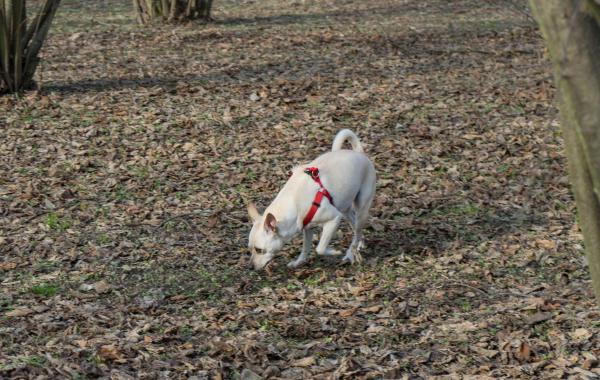Can Dogs Eat Hazelnuts?



See files for Dogs
Hazelnuts belong to the group of nuts that are very rich in nutrients such as vitamins, minerals, proteins and antioxidants, but they are also very rich in calories. Although they are unsaturated and healthy, they contain a high percentage of fat. For this reason, they are not food that you should offer your dog frequently, but only in special circumstances or very rarely.
In the following AnimalWised article you will learn everything you need to know about hazelnuts for dogs, their benefits, side effects, dosage, and contraindications.
Are hazelnuts good for dogs?
Hazelnuts are nuts, and most dogs love nuts. However, you should keep in mind that dogs have a different digestive system than we do. This means that their gastrointestinal system cannot process the high fat and calorie content of nuts the way we can. Also, every dog owner knows that dogs tend to gobble up their treats, which means you can quickly overindulge.
Hazelnuts are not toxic to dogs, but they do contain a large amount of fat and calories. For this reason, their consumption is not necessarily recommended, at least not as part of the daily diet, as they can lead to obesity and other health issues.
Benefits of hazelnuts for dogs
Hazelnuts are a very fatty food, but because of their nutrient density, they also have tremendous health benefits. Dogs could also benefit from them, but only if they are consumed occasionally as a treat. Some of the benefits that hazelnuts have for dogs are:
- They contain monounsaturated fatty acids and oleic acid: this can improve cholesterol levels and heart health, as well as control blood cholesterol levels and improve cardiovascular health.
- They are rich in antioxidants: such as phytosterols and vitamin E, which can protect against free radicals and oxidative stress.
- They contain minerals: such as magnesium, phosphorus or calcium, which contribute to the functioning of metabolism, bones, and the balance of the nervous system.
- They contain folic acid (vitamin B9) and zinc: they are particularly indicated during pregnancy and lactation. Furthermore, they are involved in red blood cell production, cell reproduction and new cell formation, and nerve development.
- They contain proteins of vegetable origin: these are ideal for muscle maintenance of our dogs.
For the risk-benefit ratio of hazelnut consumption to be positive in dogs, they should eat them only sporadically. Regular or excessive consumption of hazelnuts would cause great imbalances in the animal.

How many hazelnuts can a dog eat?
As mentioned above, hazelnuts should not be offered indiscriminately because of their high caloric content. Keep in mind that foods not in your dog's diet should never exceed 10% of daily intake.
The amount of hazelnuts you can offer your dog depends on their size. Therefore, to be on the safe side, you should not exceed the following dosages:
- Small breeds: do not offer more than 2 hazelnuts per week.
- Medium breeds: offer no more than 3 hazelnuts per week.
- Large breeds: offer no more than 4 hazelnuts per week.
How to give hazelnuts to my dog?
Following these instructions will allow you to safely give your dog hazelnuts:
- Remove the skin of hazelnuts. To do it, you can boil 1 cup (0.24 l) of untoasted hazelnuts in 2 cups (0.47 l) of water and 3 tablespoons of baking soda for 3 minutes. Then, transfer the nuts to a bowl of ice water with a slotted spoon, drain, and slip the skins off with a towel.
- Chop or grind the nuts to prevent your dog from choking them (especially if your dog is a nervous eater).
- It is okay to mix hazelnuts with your dog's natural homemade food, but it is best not to do it with commercial dog food.
- Make sure the hazelnuts do not contain additives, such as added salt, spices, or sugar. Eating too much can cause salt toxicity in your dog or a bad tummy ache.
- Hazelnuts should never be offered in combination with other nuts, especially macadamia nuts. These nuts contain more oxalic acid than hazelnuts, which can cause irritation of the esophageal and gastric mucosa and symptoms such as weakness, paralysis, dizziness, movement disorders, abdominal pain, tremors, and vomiting.
- All nuts are at risk of containing mold or fungus, which can be toxic to your dog if ingested. This is especially true of raw nuts. Therefore, only offer your dog roasted or cooked nuts to be safe. Molds can also be present on old nuts.
Side effects of hazelnuts for dogs
Due to their fat and calorie content, hazelnuts can cause your dog to gain weight if eaten frequently. This makes the animal prone to overweight and obesity, which in turn promotes metabolic and cardiovascular diseases, among others.
Because of their fat content, they can also make your dog more susceptible to developing pancreatitis, a painful inflammation of the pancreas. Pancreatitis is a condition that results from an excessive intake of fats in your dog's diet, causing inflammation of the pancreas. Acute pancreatitis is serious and requires treatment by a veterinarian.
As mentioned above, the hazelnut itself is not poisonous to the dog, but it is good to learn to recognize the symptoms of possible indisposition of the dog in connection with the consumption of the fruit. The most common symptoms include:
- Vomiting
- Difficulty passing bowel movements
- Diarrhea
- Loss of appetite
- Abdominal pain
As always, the best weapon is prevention. If your dogs like hazelnuts, be sure to keep them in a place where the dog can not get to them.
You may be interested in this other article, where we explain what to do if you suspect your dog has suffered poisoning.
Contraindications of hazelnuts for dogs
As we just discussed, you should never offer your dog hazelnuts in combination with other nuts, especially macadamia nuts, because of the risk of oxalates. Also, hazelnuts are contraindicated for dogs with the following conditions:
- Dogs that are overweight or obese
- Dogs that have or are suffering from pancreatitis
- Dogs with nut allergy of any degree
- Dogs that are sick or recovering from an injury
- Dogs that are struggling with digestive problems of any kind
If you want to read similar articles to Can Dogs Eat Hazelnuts?, we recommend you visit our Homemade diets category.






